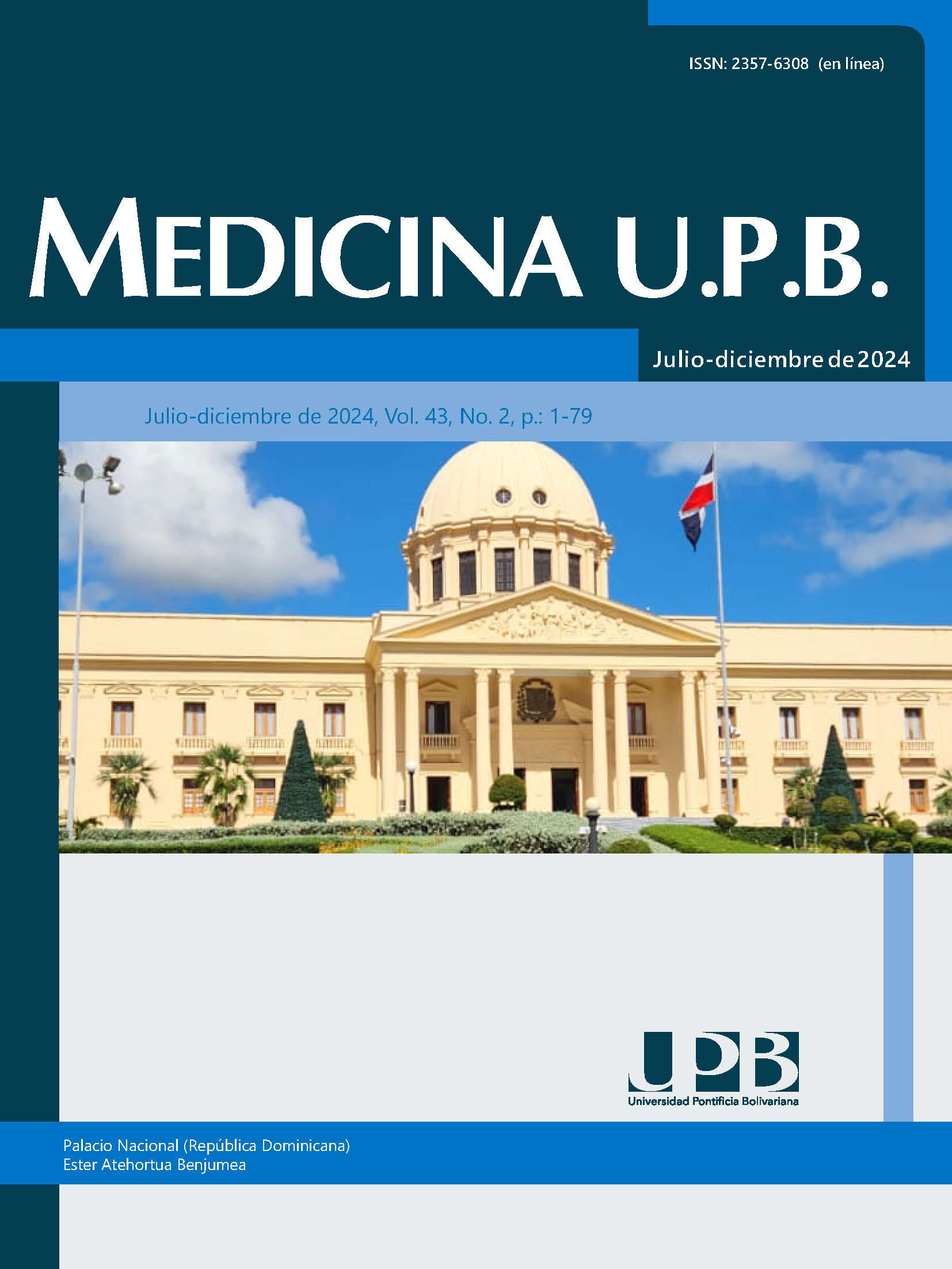Cirugía conservadora de seno y mastectomía para el manejo quirúrgico del cáncer de mama en hombres en estadios tempranos: revisión sistemática
Contenido principal del artículo
Resumen
Objetivo: el cáncer de seno en hombres es un diagnóstico subestimado y el tratamiento de elección es la mastectomía. Se han descrito diferentes técnicas quirúrgicas, entre ellas: la cirugía conservadora de mama en comparación con mastectomía simple, sin embargo, aún se desconoce la efectividad real de estas técnicas frente a la menor cantidad de complicaciones. Así que se pretendió evaluar sistemáticamente la literatura científica sobre la efectividad de estas 2 técnicas.
Metodología: revisión sistemática de la literatura hasta noviembre del 2022, donde se siguió la metodología Prisma de Cochrane. Se evaluó la mejor evidencia disponible sobre la efectividad de la cirugía conservadora de mama al compararla con la mastectomía tradicional. Otros desenlaces evaluados fueron la sobrevida global y sobrevida libre de enfermedad.
Resultados: de 1054 estudios iniciales, 7 cumplieron criterios para su selección y análisis. Ambas técnicas mostraron efectividad adecuada. En cuanto supervivencia libre de enfermedad, tanto a 5 como a 10 años, y supervivencia global no hubo significancia estadística entre las 2 técnicas quirúrgicas. Se evidenciaron más desenlaces negativos cosméticos y funcionales en la mastectomía.
Conclusiones: la cirugía conservadora de mama es una opción que se debe considerar en hombres con cáncer de mama, ya que (respecto a supervivencia libre de enfermedad y supervivencia global) no hay diferencia estadística frente a la mastectomía y puede tener mejores desenlaces cosméticos. El papel de la radioterapia adyuvante es tema de nuevos estudios adicionales.
Referencias
Fentiman IS, Fourquet A, Hortobagyi GN. Male breast cancer. Lancet. 2006;367(9510):595-604.
Hospital MG. Programa de tratamiento del cáncer de mama 2022 [cited 2024 21/02]. Disponible en: https://www.massgeneral.org/es/tratamientos/cancer/mama?utm_source=google&utm_medium=cpc&utm_campaign=FY20-international-latam-colombiacancer&utm_content=breast_cancer&utm_term=%2Bcancer%20%2Bmama&gclid=EAIaIQobChMI6LPSvvej9QIVxJ6zCh20NgsrEAAYASAAEgKuUPD_BwE
Giordano SH. Breast Cancer in Men. N Engl J Med. 2018;378(24):2311-20.
El-Tamer MB, Komenaka IK, Troxel A, Li H, Joseph KA, Ditkoff BA, et al. Men with breast cancer have better disease-specific survival than women. Arch Surg. 2004;139(10):1079-82.
Litière S, Werutsky G, Fentiman IS, Rutgers E, Christiaens MR, Van Limbergen E, et al. Breast conserving therapy versus mastectomy for stage I-II breast cancer: 20 year follow-up of the EORTC 10801 phase 3 randomised trial. Lancet Oncol. 2012;13(4):412-9.
Poggi MM, Danforth DN, Sciuto LC, Smith SL, Steinberg SM, Liewehr DJ, et al. Eighteen-year results in the treatment of early breast carcinoma with mastectomy versus breast conservation therapy: the National Cancer Institute Randomized Trial. Cancer. 2003;98(4):697-702.
Fisher B, Anderson S, Bryant J, Margolese RG, Deutsch M, Fisher ER, et al. Twenty-year followup of a randomized trial comparing total mastectomy, lumpectomy, and lumpectomy plus irradiation for the treatment of invasive breast cancer. N Engl J Med. 2002;347(16):1233-41.
Haji Seyed Ebrahim Darkeh M, Azavedo E. Male Breast Cancer Clinical Features, Risk Factors, and Current Diagnostic and Therapeutic Approaches. International Journal of Clinical Medicine. 2014;05:1068-86.
Yildirim E, Berberoğlu U. Male breast cancer: a 22-year experience. Eur J Surg Oncol. 1998;24(6):548-52.
Haviland JS, Owen JR, Dewar JA, Agrawal RK, Barrett J, Barrett-Lee PJ, et al. The UK Standardisation of Breast Radiotherapy (START) trials of radiotherapy hypofractionation for treatment of early breast cancer: 10-year follow-up results of two randomised controlled trials. Lancet Oncol. 2013;14(11):1086-94.
Welch V, Petticrew M, Tugwell P, Moher D, Petkovic J, Waters E, et al. Extensión PRISMAEquidad 2012: guías para la escritura y la publicación de revisiones sistemáticas enfocadas en la equidad en salud [PRISMA-Equity 2012 Extension: Reporting Guidelines for Systematic Reviews with a Focus on Health Equity] Vivian Welch, Mark Petticrew, Peter Tugwell, David Moher, Jennifer O’Neill, Elizabeth Waters, Howard White y el grupo PRISMA-Equity Bellagio. Revista Panamericana de Salud Pública. 2013;34:60-7.
Ribeiro GG, Swindell R, Harris M, Banerjee SS, Cramer A. A review of the management of the male breast carcinoma based on an analysis of 420 treated cases. The Breast. 1996;5(3):141-6.
Cloyd JM, Hernandez-Boussard T, Wapnir IL. Poor compliance with breast cancer treatment guidelines in men undergoing breast-conserving surgery. Breast Cancer Res Treat. 2013;139(1):177-82.
Zaenger D, Rabatic BM, Dasher B, Mourad WF. Is Breast Conserving Therapy a Safe Modality for Early-Stage Male Breast Cancer? Clin Breast Cancer. 2016;16(2):101-4.
Fields EC, DeWitt P, Fisher CM, Rabinovitch R. Management of male breast cancer in the United States: a surveillance, epidemiology and end results analysis. Int J Radiat Oncol Biol Phys. 2013;87(4):747-52.
Cutuli B, Lacroze M, Dilhuydy JM, Velten M, De Lafontan B, Marchal C, et al. Male breast cancer: results of the treatments and prognostic factors in 397 cases. Eur J Cancer. 1995;31a(12):1960-4.
Madden NA, Macdonald OK, Call JA, Schomas DA, Lee CM, Patel S. Radiotherapy and Male Breast Cancer: A Population-based Registry Analysis. Am J Clin Oncol. 2016;39(5):458-62.
Fogh S, Kachnic LA, Goldberg SI, Taghian AG, Powell SN, Hirsch AE. Localized therapy for male breast cancer: functional advantages with comparable outcomes using breast conservation. Clin Breast Cancer. 2013;13(5):344-9.
Bhardwaj PV, Gupta S, Elyash A, Teplinsky E. Male Breast Cancer: a Review on Diagnosis, Treatment, and Survivorship. Curr Oncol Rep. 2024;26(1):34-45.
Chichura A, Attai DJ, Kuchta K, Nicholson K, Kopkash K, Pesce C, et al. Male Breast Cancer Patient and Surgeon Experience: The Male WhySurg Study. Ann Surg Oncol. 2022;29(10):6115-31.
AlFehaid M. Male Breast Cancer (MBC) - A Review. Pol Przegl Chir. 2023;95(6):24-30.


